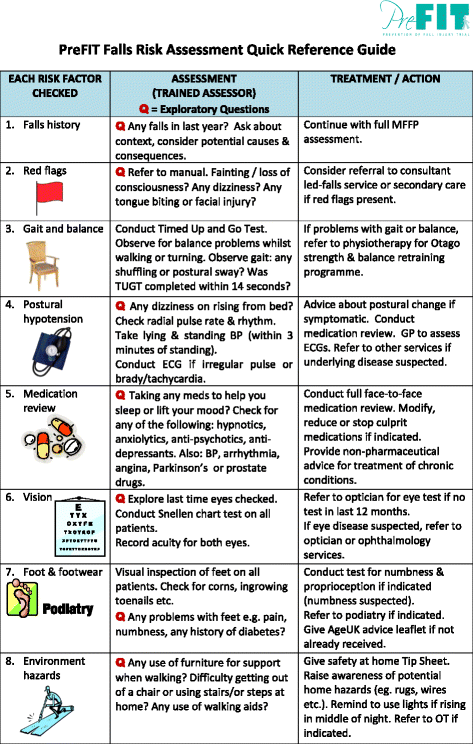Dementia Fall Risk Things To Know Before You Buy
Dementia Fall Risk Things To Know Before You Buy
Blog Article
Not known Facts About Dementia Fall Risk
Table of ContentsHow Dementia Fall Risk can Save You Time, Stress, and Money.The Ultimate Guide To Dementia Fall RiskWhat Does Dementia Fall Risk Do?The Ultimate Guide To Dementia Fall RiskThe 10-Minute Rule for Dementia Fall Risk
You may be worried due to the fact that you have actually had a loss prior to or due to the fact that you have actually noticed you're beginning to really feel unstable on your feet. You could have seen adjustments to your health, or just really feel like you're decreasing a little. Whatever the factor, it isn't unusual to end up being mindful and lose confidence, and this can quit you doing the important things you utilized to do and make you feel extra separated.If you have actually had an autumn or you've started to feel unstable, inform your medical professional also if you feel fine or else. Your medical professional can inspect your balance and the way you stroll to see if renovations can be made. They might be able to refer you for a falls threat analysis or to the drops prevention solution.
This details can be acquired through meetings with the person, their caregivers, and a review of their clinical records. Begin by asking the individual about their background of falls, consisting of the regularity and scenarios of any current falls. Dementia Fall Risk. Ask about any kind of flexibility issues they may experience, such as unstable or difficulty strolling
Conduct a thorough testimonial of the individual's drugs, paying specific focus to those understood to increase the threat of falls, such as sedatives or drugs that lower high blood pressure. Identify if they are taking numerous medicines or if there have actually been recent adjustments in their drug program. Evaluate the person's home atmosphere for possible risks that could boost the risk of drops, such as poor lights, loose carpets, or lack of grab bars in the shower room.
The 8-Second Trick For Dementia Fall Risk
Guide the individual through the loss threat assessment form, discussing each concern and videotaping their responses accurately. Calculate the total danger score based on the responses provided in the evaluation type.
This strategy may include exercise programs to boost toughness and balance, medicine modifications, home modifications, and referrals to various other experts as needed. On a regular basis keep an eye on the individual's progress and reassess their threat of falls as needed. Change the care strategy based upon changes in their wellness condition or home environment. Give continuous education and assistance to promote safety and security and minimize the danger of drops in their daily living tasks.
Several studies have actually revealed that physical therapy can help to minimize the threat of falling in adults ages 65 and older. In a brand-new study (that checked out drops risk in ladies ages 80 and older), scientists computed the economic impact of selecting physical treatment to stop falls, and they discovered that doing so conserves $2,144, consisting of all the surprise costs of your time, pain, missed life events, and the bucks paid for solutions.
Excitement About Dementia Fall Risk
Examining your balance, strength, and strolling capacity. A home security assessment. Based on the analysis results, your physical specialist will design a strategy that is customized to your certain requirements.
Older adults who have difficulty walking and speaking at the same time go to a greater risk of falling. Dementia Fall Risk. To help increase your safety and security throughout day-to-day tasks, your physiotherapist may develop a training program that will challenge you to keep standing and walking while you do another job. Instances include strolling or standing while counting backwards, having a discussion, or bring a bag of grocery stores
Your physical specialist also can determine which activities you must avoid to stay secure. Community-based falls avoidance programs help individuals to: Reduce their concern of falling. Set objectives for enhancing their physical task. Make their homes safer. Work out extra to enhance their toughness and balance. These programs usually are led by volunteer trainers.
The Single Strategy To Use For Dementia Fall Risk

Measles, or rubeola, is a highly transmittable, acute viral transmittable disease brought on by the measles infection. Some people assume of measles as just a rash and high temperature that improves in a couple of days; however, measles can create significant their explanation health and wellness problems, particularly in children more youthful than 5-years-old. The best protection against measles is the measles, mumps, and rubella (MMR) injection.
Loss are an usual root cause of injury among older adults. According to the CDC, in one year alone, fall-related injuries added to over $50 billion in medical expenses (Dementia Fall Risk). In hospital setups, older adults are at particularly high risk of falls since their decreased wheelchair from being constrained to an area or bed.
Some Known Questions About Dementia Fall Risk.

She has no background of falls, her stride is consistent, and she why not try these out nullifies with no concerns. The previous nurse states that she calls for assistance to the shower room when she directory needs to go.
Instances of typical fall interventions/measures consist of: Making sure a client's important items are available. Putting the person's bed rails up with the alarm system on. Assisting an individual while they're rising from bed. Past understanding just how to use the Johns Hopkins Loss Risk Analysis Tool, it is very important that facilities integrate its usage into an extra comprehensive autumn prevention plan.
Report this page